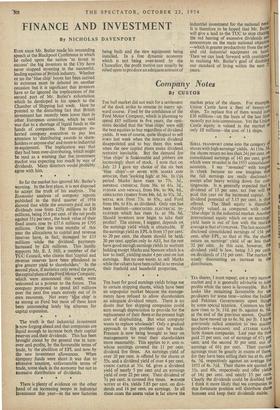FINANCE AND INVESTMENT
By NICHOLAS DAVENPORT
EVER since Mr. Butler made his resounding speech at the Blackpool Conference in which he called upon the nation `to invest in success' the big investors in the City have never stopped investing in the successful, leading equities of British industry. Whether or no the 'blue chip' boom has been carried to extremes must be debated on another occasion but it is significant that investors have so far ignored the implications of the second part of Mr. Butler's exhortation which he developed in his speech to the Chamber of Shipping last week. Here he pointed to the disturbing fact that British investment has recently been lower than in other European countries, which he said was due to a shortage of liquid funds in the hands of companies. He thereupon ex- horted company executives to pay less
attention to 'distributing awards to share- holders or anyone else' and more to industrial re-equipment. The implication was that they had been over-distributing, which might be read as a warning that the investment Market was expecting too much by way of dividends. Many directors would probably agree with him. • • •
So far the market has ignored Mr. Butler's warning. In the first place, it is not disposed to accept the truth of his analysis. The Economist analysis of company reports published in the third quarter of 1954 showed that while the amounts paid out in dividends rose from £251 millions to £30 millions, being 35.8 per cent. of the net profit against 331 per cent., the book value of their fixed assets rose by £57.6 millions to £795 millions. Over the nine months of this year the allocations to capital and revenue reserves have, in fact, increased by £33 millions while the dividend payments Increased by £26 millions. This hardly supports Mr. E. J. Hill, a member of the TUC Council, who claims that 'capital and revenue reserves have been plundered to give greater yield to shareholders.' In the second place, if statistics only reveal the past, the capital plans of the Ford Motor Company, which were announced this week, were welcomed as a pointer to the future. This company proposed to spend £65 millions Over the next five years entirely out of its own resources. Not every blue chip' is as strong as Ford but most of them have been announcing lately big schemes for capital expansion.
• The truth is that industrial investment Is now forging ahead and that companies are liquid enough to increase both their capital reserves and their dividends, This has been brought about by the general rise in turn- over and profits, by the favourable terms of trade, by the abolition of EPL and now by the new investrfient allowances. When company funds were short it was due to excessive taxation, unfavourable terms of trade, some slack in the economy but not to excessive distribution of dividends.
* There is plenty of evidence on the other band of an increasing tempo in industrial Investment this year-in the new factories being built and the new equipment being installed. In a free dynamic economy which is not being over-taxed by the Chancellor, the profit motive can usually be relied upon to produce an adequate amount of
industrial investment for the national tu It is therefore to be hoped that Mr. Bu will give a lead to the TUC to stop chat the red herring of excessive dividends concentrate on the main national objec -which is greater productivity from the 1 and old industrial equipment on ha Then we can look forward with confide to realising Mr. Butler's goal of doub our standard of living within the next years.
eed tld in! no livt
nd
1111


































 Previous page
Previous page